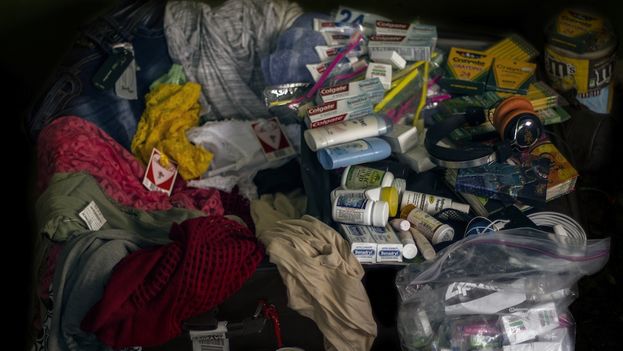
14ymedio, VÍCTOR ARIEL GONZÁLEZ, Havana. 24 November 2014 — From food to motorcycles, stuffed into plastic water tanks, Cubans use the most improbable ways to introduce products into their country. But it has nothing to do with drugs or weaponry, but basic necessities intended as much to satisfy consumer demand as to supply a retail market that the state – so far – is incapable of supplying.
In one of the usual reports by national television where they intend to lecture the audience, an official reporter recently stressed that “Customs has confiscated several containers with articles that are not classified as household goods because among them are clothes, footwear, toiletry articles and foods. Also home construction or repair materials, fixtures and all kinds of spare parts, water tanks full of miscellaneous items, a central air conditioning unit compressor and internal combustion engines, new and disassembled, in order to trick customs control.”
“Household goods” is one of the classifications that General Customs of the Republic (AGR) employs for products that Cubans bring to the Island when they return from a trip or that they send here in packages.
The reason for the irregularities described by the press, according to an AGR official named Yudesis Alfonso, lies in the fact that “one of the fundamental advantages for individuals is that household goods are exempt from payment of Customs duties. And it is regrettable that there are people who use this operation to try to introduce merchandise into the country without declaring it to Customs as legislative decree 162 of 1996 specifies in article 6.”
In the words of Jorge Alberto, a Cuban with a Spanish passport who for months served as a mule for the importation of small volumes of merchandise in exchange for 150 CUC per trip, “What is really regrettable is that we have to bring hidden things in because the stores are bare.” When the government intensified the administrative measures about what it considers “commercial importation,” in addition to prohibiting the sale of clothes and footwear, Jorge Alberto was left without work, and what he will do now is finally emigrate from Cuba.
AGR is part of a strict system of state control that hinders the development of private businesses in Cuba where there exists no wholesale market for many self-employed activities. For this institution it is quite an achievement to display for the cameras cases such as the one that one of its officials, Aniuska Navarro, describes: “Within this white tank was an internal combustion motor, separated into pieces. This tank had to be broken up in order for us to be able to gain access to the pieces of the motor.”
The television report concludes that “Customs … is in a constant fight against the illegalities,” in a country whose domestic economy survives thanks to the black market.
The regulation of “household goods” exception is legally regulated by resolution 43/1998 by the Ministry of Finances and Prices and resolution 122/2009 by the AGR, but “on occasions” citizens have been found “importing into the country great volumes of merchandise which show a marked commercial character” as well as “the intention to import articles belonging to third parties who should use a different Customs regulation, which involves paying tariffs in convertible pesos.”
Which is to say that besides confiscation of the articles – whose subsequent fate is unknown – the offenders are criminally prosecuted for tax evasion, “being accused just as they should be to the competent agencies: the Ministry of the Interior and the system of justice.”
Among those affected, a group that includes businesses as much as consumers, opinions like those of Jorge Alberto abound. “The customs taxes that are so high are the essential reason that we commit these crimes. They don’t let us raise our heads.”
Translated by MLK
